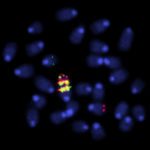Link to Pubmed [PMID] – 16753863
Leuk. Lymphoma 2006 May;47(5):791-801
B-chronic lymphocytic leukemia (B-CLL) is characterized by a highly variable clinical course which has long remained a stumbling block for clinicians. This variability appears to arise from complex molecular alterations identified in malignant cells from patient subsets. Recent studies have focused in particular on identifying new molecular markers to help predict the most effective and adapted treatments. In addition to the mutation status of immunoglobulin variable heavy-chain region (IgVH) genes, which is a well-established predictive factor in B-CLL, these new markers include defects of cell factors involved in the maintenance of genome stability, such as telomere function, DNA repair, ATM and p53. Other predictive factors, such as tyrosine kinase Zap-70 and soluble factors found in patient sera, may be associated with B-cell receptor signal transduction. Interestingly, an alteration of these factors fits closely, though not strikingly, with the absence of somatic mutations in IgVH genes, suggesting that the latter may be due either to epigenetic events leading to an unstable genome or to an inherited defect in the immune response of malignant B-cells. Recent lessons from Zap-70 expression/phosphorylation suggest that some of these markers may reflect the defective pathways in B-CLL cells rather than being markers of cell malignancy per se. Furthermore, specific subsets of markers are found in patient cells resistant to treatment. Current studies on gene expression profiling and proteomic analyses should soon lead to a better understanding of how these pathways are affected, especially in multi-drug resistant B-CLL.

